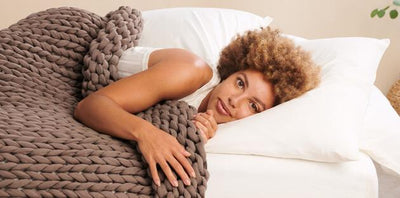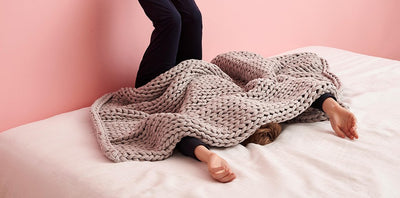Are Six Hours of Sleep Really Enough?
Getting a good night's sleep doesn’t always come easy. Let’s explore what people’s average sleep needs are and find out if six hours of sleep is enough.

Bearassentials
Our sleep needs evolve with ag.– infants can need up to 19 hours of sleep whereas adults typically require a consistent 7-9 hours to function at their best.,
Sleep quality and quantity matters! Lacking in either can have repercussions for physical and mental health.
Top tips for getting restorative rest include creating a conducive sleep environment, following a regular sleep schedule, and minimizing stimulants near bedtime.
Did you know?
Elephants sleep just two hours a day in the wild, despite their enormous size!
Conventional wisdom suggests eight hours as the gold standard for sufficient sleep, but with the relentless pace of our modern lives, many wonder if six hours could suffice.
Recommended Hours of Sleep by Age
Our sleep needs evolve from infancy to adulthood, so it is important to adjust your sleep schedule according to your stage of life. Here’s the recommended amount of sleep you need depending on your age:
Babies
Each baby is unique and has their own sleep needs,but in general babies need a lot of sleep – some may sleep as many as 19 hours a day up to about three months of age! Newborns typically sleep between 12 and 16 hours a day, and this can decrease to 11 to 14 hours a day when they reach the one year mark.
Toddlers and Preschoolers
By the toddler stage, children aged 3-5 years old require around 10 to 13 hours of sleep for optimal development. Remember that for some kids this can be night time rest and an afternoon nap. Others drop the daytime nap and sleep longer at night. Find the rest routine that works for your child.
Young Kids and Tweens
When kids are between 6-12 years old, they should typically be sleeping 9 to 12 hours a day. So if you have ever wondered if 6 hours of sleep is enough for a 12 year-old, the answer is no.
Teenagers
Teenagers – aged 13 to 18 years old – need 8 to 10 hours of sleep per day. If your teenager gets by with 6 hours of sleep, that is not enough to sustain their growing body. Many teenagers struggle with sleep and research even suggests that during the teenage years the tendency to become a night owl has a biological basis.
Adults
Let’s zoom in on how much sleep adults need: Once you reach adulthood, research shows that most adults need at least 7 hours of sleep per 24-hour period, while 8 hours of sleep is the standard recommendation. While these recommendations are helpful starting points, remember that exact sleep needs vary from person to person.
Approximately one-third of adults regularly sleep for six hours or less each night, and surveys suggest that shorter nights may be growing to become more and more the norm. . A small percentage of people need less than six hours per night – research shows that genetics can play a role in a person’s ability to thrive despite getting less than the average recommended sleep.
While sleep needs can slightly decrease as we gets older, there is no set answer on how much sleep a 40-year-old, or any specific adult age group needs.Most people need the minimum amount of sleep of seven to eight hours to maintain good sleep health.
If you feel you are coping with only getting 4-6 hours of sleep every night, this does not mean that around 5 hours of sleep is enough for you. The reason you might feel productive with only five or six hours of sleep can be the result of increased cortisol levels from sleep deprivation, which might help you feel alert but can damage your health in the long run.
One way to gauge if sleep needs are being met, is by taking note when your body wakes up naturally, without an alarm clock. If you don’t feel tired during the day, that is a good sign that you are getting enough rest; if you need stimulants like caffeine to help you feel more awake, you likely need more hours of sleep.

Sleep Deprivation: The Side Effects of Not Getting Enough Sleep
Getting good quality sleep is crucial. Most of us have experienced how exhasution and fatigue can impact our ability to function well during day. Beyond that sleep deprivation can also impact many areas of your health and wellbeing including mental health and clarity, physical health, immune system function, appetite regulation, and cell and tissue repair.
Mental Consequences of Short Sleep
Some immediate effects of sleep loss include daytime drowsiness, lack of energy, and reduced motivation. While it is natural for many people to feel sleepy at certain times of the day – such as in the afternoon – being excessively tired, waking up exhausted after a night’s sleep, and struggling with brain fog can be signs that you are sleep deprived. If you have trouble concentrating and find yourself less productive, as well as more forgetful, try to get more rest and see if these symptoms ease up.
Poor Mood From Sleep Deprivation
People who don’t get enough sleep tend to feel cranky; in the short term, sleep deprivation can cause difficulty managing emotions and a tendency toward irritability and restlessness. Prolonged sleep deprivation may increase the risk of developing depression and anxiety, and potentially other mental health issues too.
Micro-sleep
Micro-sleep happens when your brain zones out for very short periods. People who are sleep-deprived experience this phenomenon. ; If you've ever almost had an accident because you fell asleep while driving, or made an embarrassing mistake at work when you know that you know better, poor sleep can be a likely culprit.
Long-Term Health Effects of Sleep Deprivation
Chronic sleep deprivation can lead to significantly increased risk to overall health and specific concerns, and has been linked to kidney disease and health issues such as obesity, type 2 diabetes, and metabolic syndrome. Consistently cutting sleep short can raise a person’s risk for cardiovascular diseases including high blood pressure, heart disease, and stroke. It can also contribute to premature aging.
It’s clear that getting enough sleep is crucial to our health and well-being, so let’s take a look at a few simple ways that can help you get the best restorative rest!

How to Get Enough Sleep
To sleep better, try improving your sleep hygiene with these daily habits.
Follow a Regular Schedule
If you are following a sleep cycle optimal for your circadian rhythm, you may not even need an alarm to wake you up and still feel refreshed!
Your circadian rhythm influences sleep quality and sleep patterns and is essentially the fluctuation of your hormone levels (regulated by your brain) that tells your body when to start winding down and when to wake up. While sleeping in on the weekend is how many try to cut down on sleep debt, this can interfere with your natural sleep-wake rhythm. The best strategy is to keep consistent sleep and wake times that allow for at least seven hours of sleep every night – only six hours of sleep is not ideal.
Create a Comfortable Bedtime Environment
Now that you know how long you should be sleeping, it is time to change your sleep environment. You can start by winding down with a relaxing bedtime routine, including quiet activities such as meditation, reading, or taking a warm bath.
Consider optimizing your sleep space: keep the bedroom environment dark and quiet, minimizing exposure to screen light before sleep. The blue light that electronics produce mimics outdoor lights, tricking your brain into thinking it’s daytime and disrups circadian rhythm. We recommend you put away electronic devices at least half an hour before bedtime.
If you have trouble sleeping despite adjusting your room settings, a weighted blanket can also help. The Deep Touch Pressure (DTP) from an evenly spread weight over your body can reduce stress and anxiety and help you drift off into more restorative sleep. If you’ve never used a weighted blanket before, our 10 lbs Cotton Napper is a good place to start. Take your sleep game to the next level and pair your weighted blanket with a body pillow. Opt for one that provides ergonomic support to help ensure better body alignment during the night.
Cotton Napper

Dreamy, buttery softness
Calms body & mind for deeper sleep
Hand-knitted huggable comfort
It's Napper Time
Get Those Steps In!
What you do during the day impacts sleep as much as your bedtime routine; make sure you get enough exercise for better rest! Regular exercise supports a healthy internal clock, and can help reset your circadian rhythm when you are trying to get it back on track. Keeping fit is also crucial for your overall health, and can improve your mood and ability to regulate stress response.
Minimize Caffeine, Alcohol, and Nicotine
Stimulants often cause sleep problems, especially if they are taken too close to bedtime. While alcohol intake close to bedtime has the illusion of helping people fall asleep, it’s not the case. This is likely because alcohol ingestion can stop REM sleep, a sleep stage that researchers have proved is critical for mental and emotional well-being.
Other substances can also cause sleep problems - a well-known example being caffeine, which increases alertness by impacting our cortisol production. As caffeine can stay in your body for at least seven hours, be mindful of your caffeine intake during the day.
Smoking and vaping can also lead to nighttime sleep apnea, snoring, and reduced quality of sleep. Nicotine also has other significant health consequences, such as an increased risk of cardiovascular disease.
If you still have trouble sleeping despite implementing all these tips, it might be a good idea to consult a a sleep specialist, who can provide additional recommendations or help diagnose an underlying sleep disorder.
Conclusion
In the hustle and bustle of modern life, the question of how much sleep is truly necessary remains a lingering question. While individual sleep needs vary, one thing is certain: quality sleep is not a luxury but a fundamental requirement for overall well-being. As we explored the sleep needs for different age groups and the consequences of sleep deprivation, it's evident that there's no shortcut to restorative rest. Six hours of sleep might seem sufficient, but in reality, the consequences of chronic sleep deprivation are far-reaching.






